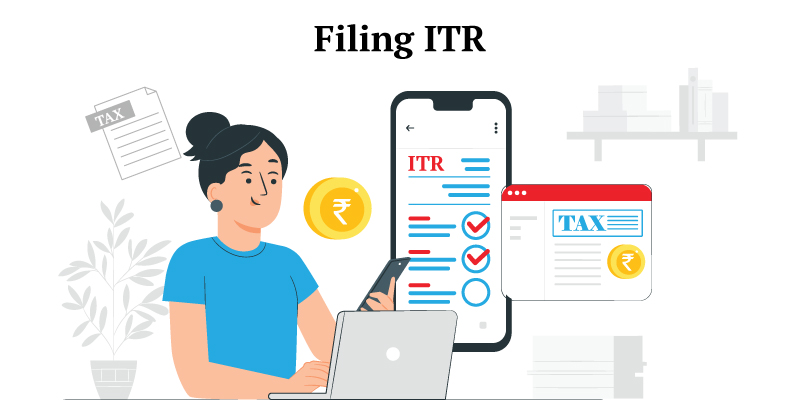User Intent
Users searching for “When should ITR be filed?” are looking for clear information about income tax return (ITR) filing deadlines, legal requirements, benefits, and possible consequences of late filing. This article provides an in-depth guide covering all crucial aspects, ensuring readers make informed decisions while staying compliant with tax laws.
Introduction
Filing an Income Tax Return (ITR) is a crucial financial responsibility for individuals and businesses. It is not just about tax payments but also about maintaining transparency with the government regarding your earnings. Missing the filing deadline can result in penalties and legal consequences. But when exactly should ITR be filed? Understanding the timeline and its importance can save taxpayers from unnecessary stress and financial losses.
Definition of ITR Filing
An Income Tax Return (ITR) is a formal statement submitted to the tax authorities, detailing income, deductions, and tax liabilities for a specific financial year. It helps in tax assessment and ensures compliance with the country’s tax regulations.
In India, the financial year runs from April 1st to March 31st, and the assessment year (AY) follows immediately after. The due date for ITR filing varies based on the type of taxpayer, such as individuals, businesses, or companies.
Application: Who Should File and When?
ITR filing is mandatory for individuals and entities meeting certain criteria. Below are the applicable categories and their respective deadlines:
1. Individuals and Hindu Undivided Families (HUFs)
- Due Date: July 31st of the assessment year (e.g., for FY 2023-24, the due date is July 31st, 2024).
- Applicable To: Individuals with income exceeding the basic exemption limit (₹2.5 lakh for individuals below 60 years, ₹3 lakh for senior citizens, and ₹5 lakh for super senior citizens).
- Including: Salaried employees, freelancers, and pensioners.
2. Businesses and Professionals (Tax Audit Cases)
- Due Date: October 31st of the assessment year.
- Applicable To: Businesses and professionals whose accounts require a tax audit under the Income Tax Act.
3. Companies and LLPs
- Due Date: October 31st of the assessment year.
- Applicable To: All registered companies, irrespective of profit or loss.
4. Individuals Filing Late Returns
- If you miss the deadline, you can file a belated return by December 31st of the same assessment year but with a penalty.
- A revised return can be filed before December 31st if errors are found in the original return.
Benefits of Timely ITR Filing
Filing your ITR on time offers several advantages:
1. Avoiding Penalties
- Late filing attracts a fine of up to ₹5,000 under Section 234F.
- Additional interest charges under Section 234A, 234B, and 234C.
2. Easier Loan Approval
- Banks and financial institutions consider ITRs as proof of income when granting loans.
3. Claiming Refunds
- If excess tax has been deducted, an ITR is necessary to claim a refund from the Income Tax Department.
4. Carry Forward Losses
- Businesses and investors can carry forward losses for future tax deductions only if ITR is filed on time.
5. Visa Applications
- Many countries require ITR proof for visa processing, particularly for business and work visas.
Limitations of ITR Filing
While filing ITR is beneficial, there are certain limitations:
1. Complex Procedures
- Tax calculations, deductions, and exemptions can be complicated for beginners.
2. Strict Deadlines
- Missing deadlines leads to penalties and interest, causing financial strain.
3. Documentation Challenges
- Gathering all necessary documents, such as Form 16, investment proofs, and expense records, can be time-consuming.
Comparative Table: Different Taxpayer Categories and Deadlines
| Taxpayer Type | ITR Filing Deadline | Penalty for Late Filing |
|---|---|---|
| Salaried Individuals | July 31st | Up to ₹5,000 |
| Businesses (Audit) | October 31st | Additional interest |
| Companies & LLPs | October 31st | Additional interest |
| Belated Filing | December 31st | Up to ₹5,000 |
Conclusion
Filing an Income Tax Return (ITR) on time is not just a legal obligation but also a financially wise decision. It ensures compliance with tax laws, helps claim refunds, and makes financial transactions smoother. Understanding the deadlines based on your income source and tax obligations is crucial to avoid penalties and ensure hassle-free tax compliance.
FAQs
1. What happens if I miss the ITR filing deadline?
If you miss the due date, you can file a belated return until December 31st but with a penalty of up to ₹5,000. Additionally, interest on unpaid taxes will be applicable.
2. Can I file ITR after the deadline?
Yes, but it will attract late fees and interest. It’s always advisable to file before the due date to avoid complications.
3. Do I need to file an ITR if my income is below the taxable limit?
If your income is below the taxable limit, filing is not mandatory. However, if you have foreign assets, high-value transactions, or want to claim tax refunds, filing is recommended.
4. How can I check if my ITR has been filed successfully?
You can verify your ITR status on the Income Tax e-filing portal by logging into your account and checking the acknowledgment number.
5. What documents are required for filing ITR?
Essential documents include PAN, Aadhaar, Form 16, salary slips, investment proofs, bank statements, and TDS certificates.

To visit https://www.incometax.gov.in

